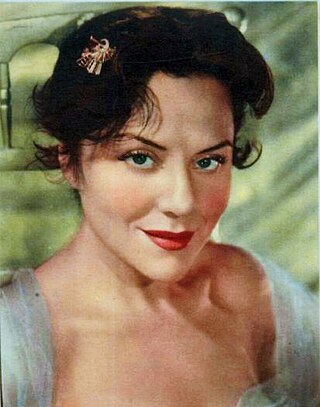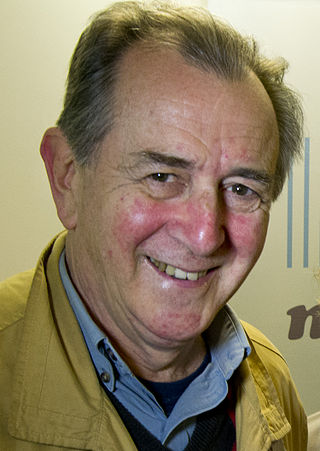
Guillermo Héctor Francella is an Argentine actor and comedian. Besides a long history of working as a television leading man, he also has a varied theatrical and film career. Francella is widely regarded by experts and critics of performance as one of the most influential and popular actors of his country.

Gustavo Cabral, better known as Ciruelo, is an Argentine fantasy artist, whose work focuses especially on dragons.

Cinema of Argentina refers to the film industry based in Argentina. The Argentine cinema comprises the art of film and creative movies made within the nation of Argentina or by Argentine filmmakers abroad.

Amelia Bence was an Argentine film actress and one of the divas of the Golden Age of Argentine Cinema (1940–60).

Laura Ana "Tita" Merello was an Argentine film actress, tango dancer and singer of the Golden Age of Argentine Cinema (1940–1960). In her six decades in Argentine entertainment, at the time of her death, she had filmed over thirty movies, premiered twenty plays, had nine television appearances, completed three radio series and had had countless appearances in print media. She was one of the singers who emerged in the 1920s along with Azucena Maizani, Libertad Lamarque, Ada Falcón, and Rosita Quiroga, who created the female voices of tango. She was primarily remembered for the songs "Se dice de mí" and "La milonga y yo".

Roberto Escalada born Aldo Roberto Leggero was an Argentine actor, an icon of the classic era of Argentine cinema.
Eliseo Alberto Subiela was an Argentine film director and writer. His works are considered to be in the 'magic realism' genre.

Lorenzo Quinteros was an Argentine cinema and theatre actor.

Man Facing Southeast is a 1986 Argentine science fiction drama film written and directed by Eliseo Subiela, starring Lorenzo Quinteros and Hugo Soto.

Lito Cruz was a prominent Argentine stage director and motion picture actor.

Raúl Lavié nickname El Negro, is an Argentine entertainer prominent in the Tango genre.

Thelma Biral is an Argentine actress working in cinema, television and theatre.

Duilio Marzio was a well-known Argentine cinema and theatre actor.
The Effect of Love is a 2007 Argentinian drama film, written and directed by Eliseo Subiela, an Argentinian film director. The film was shot in Buenos Aires and San Luis in Argentina.
Julieta Ortega is an Argentine actress. She is the daughter of Palito Ortega and Evangelina Salazar and sister of Martín Ortega, Sebastián Ortega, Emanuel Ortega and Luis Ortega.

Fernando César Ochoa was an actor from Argentina who appeared on radio, in films and on TV.

Toro Loco: Sangriento a.k.a. Toro Loco: Bloodthirsty is a 2015 Chilean black comedy action film directed and written by Patricio Valladares. It features a mixed cast of relatively Well-known Chilean actors, including Francisco Melo, Constanza Piccoli, Simon Pesutic, Mauricio Pesutic, Cuentrejo.

The Dark Side of the Heart is a 1992 Argentine surrealist romantic drama film written and directed by Eliseo Subiela. The film was selected as the Argentine entry for the Best Foreign Language Film at the 65th Academy Awards, but was not accepted as a nominee. It is currently considered a cult film.

Chela Ruiz was an Argentine actress. Her career spanned radio, film, television and stage, and in 1997 the Argentine Association of Actors awarded her the prestigious Premio Podestá for her theatrical work.
The Dark Side of the Heart 2 is a 2001 Argentine-Spanish surreal drama film written and directed by Eliseo Subiela, which stars Darío Grandinetti and Ariadna Gil. It is a sequel to 1992 film The Dark Side of the Heart, following on the vicissitudes of the character played by Grandinetti in his search for an ideal woman.















